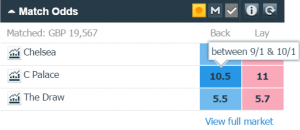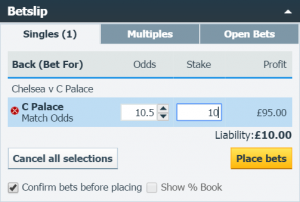Beginner’s Guide to Betting Exchanges
eBay brings buyers and sellers together. A seller lists an item on eBay in the hope that someone will want to buy that item. There’s no guarantee this will happen. So why do sellers go to the trouble of listing an item on eBay (photographing the item, coming up with some descriptive text, working out how much to charge for postage and so on) when the item may not sell. They could try a high street alternative who would definitely buy their item, removing uncertainty and saving them time (no listing chores, no having to answer buyer’s questions, no having to go out and post the item etc.)
Sellers choose eBay because they hope to get a better price. They use the site to offer the item to as many potential buyers as possible. Unless the seller’s item has to be collected in person, it does not matter whether the buyer lives in the same area as the buyer. So, the buyer and seller can be entirely different parts of the country or in different countries.
Because most sellers on eBay don’t have the overheads associated with high street premises, buyers hope they will get their items for a cheaper price than a shop.
Sellers have various ways of setting a price for their item, they can set a buy it now price or, in the hope they will get more, enter a starting bid or reserve price
Sellers publish their item, which makes it visible to potential buyers. The item may or may not sell.
eBay acts as an intermediary in this process, matching buyers with sellers and charges sellers a fee in return for the service it provides.
Betting Exchanges are like eBay
Betting exchanges are like eBay in that they bring bettors together. Instead of buying and selling goods, betting exchange users buy and sell bets. This may seem like a strange way of putting it, especially if your only exposure to betting is a punt on the grand national at your local bookies. However, when you go into a betting shop, you are buying a product just like you would in any other type of shop. Bookies work out what they think will happen in a horse race, football match, golf tournament and so on. They then price bets up based on this assessment and offer them to you. When you place a bet at a bookie, you are buying their product. And that product contains a profit margin that is included in the odds.
So why not simply strike up a bet with a friend or workmate? What advantage does using a betting exchange give you? When you place an informal bet you usually win or lose an amount that is equal to your stake. The implied odds are unlikely to reflect the actual likelihood of the outcome you are betting on. The odds may be poor value or good value (in reality you are probably betting on something you want to happen instead of something that you think is likely to happen). The key thing to bear in mind is that successful betting relies on the odds.
Odds and Value
Odds should express the likelihood of something happening. If you were betting on something with a fifty-fifty chance of happening, the odds should be evens (or 2.0, which is the betting exchange equivalent of evens). If they are lower than this, the odds are poor value and, should you win, you will receive less than you should. This is important because your long term betting success relies on your wins offsetting your inevitable losses. You therefore need the odds to give you the proper return when you win.
Two factors increase the likelihood that odds on a betting exchange are good value. First, unlike a bookmaker there’s no profit margin built into the odds. Second, just like in any other marketplace, poor value bets are unlikely to find a buyer on a betting exchange. The odds are shaped by buyers and sellers until a happy medium is reached, which generally means those odds accurately reflect the chances of a particular outcome happening.
If you need a second opinion, you can always use an odds comparison site such as http://www.oddschecker.com to double-check that the odds on offer on the betting exchange are the best you can get.
Although you will have to pay a commission charge to the betting exchange if you bet wins, you will know in advance exactly what this will be, as the applicable commission charges are published on the exchange. This is different to the charges you pay at a bookie, you won’t know what how much profit margin is included in their odds.
Betting Exchanges Versus Bookmakers
Assume you’re walking down the high street and you pass a bookies. You may see a poster in the bookies promoting a betting market based on a premier league fixture, which will say something like “If you bet £10 on Crystal Palace and they win, you’ll get £80!”. So you know that if you buy this £10 bet of the bookmakers, you will receive the chance to win £80. You’re presented in a nutshell, what your risk is and what your potential reward will be.
How is the equivalent bet presented to you on Betfair? (Although there is more than one betting exchange, this article will now talk about Betfair as that is the most popular exchange.) The example bet was based around Chelsea versus Crystal Palace. We need to find the betting market on Betfair that allows us to bet that Crystal Palace will beat Chelsea.
The first thing to do is go to the Betfair site (http://www.betfair.com). Click on the Exchange link on the bar that runs across the top of the Betfair site. There are several ways of navigating to the Chelsea versus Crystal Palace betting markets . One quick way is to use Betfair’s search facility. Type in “Chelsea v Crystal” and press RETURN to display all the betting markets based around this fixture. The equivalent market to the one in the bookies is the Match Odds market. This is where we can bet on either team winning or a draw.
Unlike the odds format you may have seen at a bookies, the odds on a betting exchange are decimal odds. The odds on a Crystal Palace win are 10.5, which the popup window tells us are between 9/1 & 10/1, which is the fractional odds format used by bookies. Choose 10.5 to display the betting slip, which will show what the profit will be if Palace win. (This doesn’t commit you to placing the bet!) Typing in 10 in the stake box, shows that the profit would be £95, which even after commission is deducted exceeds what the bookie was offering.
Backing and Laying
If we go ahead with this bet, we are backing Crystal Palace i.e. we think that this team will win the match. The lay side of the match odds markets shows us the best available odds for us if we take the opposite view. (This is the Bookie’s position if we place a bet with them. We win £80 if Crystal Palace win, we give the bookie our stake if Palace fail to win.) So on Betfair, if we’re sure that Crystal Palace cannot beat Chelsea, but we’re not sure whether they just might get a draw, we could lay the Palace win. If we enter £10 in the betting slip, we will receive £10 if Chelsea win or draw and will lose £100 if Crystal Palace win.
This illustrates a fundamental betting exchange concept, which the article mentioned earlier: betting exchanges bring bettors together. If you want to place a bet on an exchange, another bettor must have a different opinion to yours. You can only place a back bet if someone else is prepared to lay that bet and vice versa. You can only win £95 if someone with a different opinion is prepared to accept a liability of £95.
If you are the first to place a bet on the market or request odds that other bettors think are poor value, your bet will initially be unmatched, and may remain so. Betfair are not a bookie, you are not betting against them. Your bet is only placed when another bettor accepts it. If you have a large stake then your bet may only be partially matched. Betfair will match opposing bettors to accept as much of your bet as possible, but if there aren’t enough of them, some of your stake will remain unmatched.




